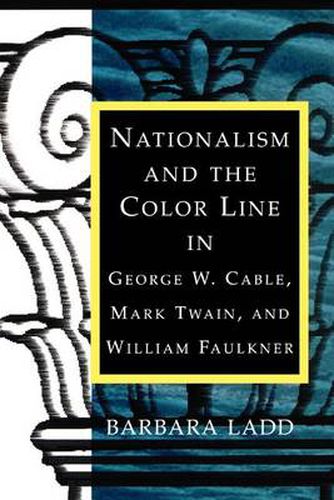Nationalism and the Color Line in George W. Cable, Mark Twain, and William Faulkner
Barbara Ladd

Nationalism and the Color Line in George W. Cable, Mark Twain, and William Faulkner
Barbara Ladd
This title is printed to order. This book may have been self-published. If so, we cannot guarantee the quality of the content. In the main most books will have gone through the editing process however some may not. We therefore suggest that you be aware of this before ordering this book. If in doubt check either the author or publisher’s details as we are unable to accept any returns unless they are faulty. Please contact us if you have any questions.
Nationalism and the Color Line in George W. Cable, Mark Twain, and William Faulkner is a strikingly original study of works by three postbellum novelists with strong ties to the Deep South and Mississippi Valley. In it, Barbara Ladd argues that writers like Cable, Twain, and Faulkner cannot be read exclusively within the context of a nationalistically defined
American
literature, but must also be understood in light of the cultural legacy that French and Spanish colonialism bestowed on the Deep South and the Mississippi River Valley, specifically with respect to the very different ways these colonialist cultures conceptualized race, colour, and nationality. Ladd probes the work of these writers for discontinuities, for moments of narrative incoherence, from which she charts the ideological winds that blew through the United States in the nineteenth and early twentieth centuries. In Cable’s The Grandissimes, written at the beginning of the Redemption era, the discontinuities are strategic whispers to the reader about the reality of racial division and violence that lay beneath the white reconciliation romance. Twain’s Pudd'nhead Wilson and Those Extraordinary Twins also inscribes racial discord, although with the added dimension of experimentation with form. And in Absalom, Absalom! and Light in August, narrative incoherence becomes central as Faulkner explores the impact of radical racism on the ways that whiteness was constructed in the early twentieth century. Neither
race
nor
nation,
Ladd shows, is stable in the work of these writers, but is always contested and shifting.Ladd’s book raises provocative questions about the relationships between race, region, and nationalism in literary study. With its innovative approach and rich New Historicist method, it is an important contribution to scholarship in several fields.
This item is not currently in-stock. It can be ordered online and is expected to ship in 7-14 days
Our stock data is updated periodically, and availability may change throughout the day for in-demand items. Please call the relevant shop for the most current stock information. Prices are subject to change without notice.
Sign in or become a Readings Member to add this title to a wishlist.


